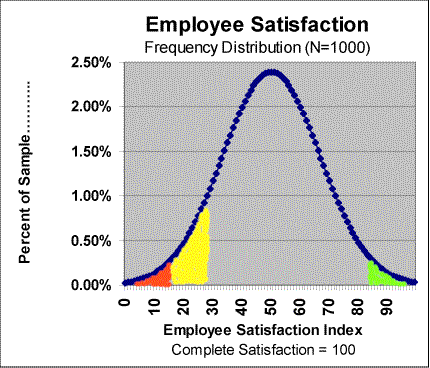| ............. |
This article was posted on September 1, 1999. Once you've reached the level of financial independence where you can comfortably live on a 4% annual inflation adjusted withdrawal from your savings, you can likely safely retire. But should you? Hard as it is to imagine, some people actually like what they're doing and enjoy going to work in the morning. Does that describe you? Like most human characteristics, employee job satisfaction is "normally distributed." That means that job satisfaction ranges from high to low, with the majority of folks lining up somewhere in between. This familiar "bell-shaped curve" is depicted in the graph below.  The top 5% of employees, those in the green area on the graph, love to come to work and would rather be working than doing just about anything else. (Many even volunteer to take notes for the boss at meetings.) Nothing wrong with that. I hope the companies I invest in have lots of these folks on the payroll. The bottom 5% of workers, the red area on the graph, would rather be just about anyplace but "work." A recent news item recounted the jury deliberations in a murder case. One juror hung onto a "not guilty" verdict and refused to budge or explain his reasoning. It was later determined that the man hated his job and wanted the court proceedings to continue so that he wouldn't have to return to work (he actually agreed that the defendant was guilty!) If jury duty is preferable to a day at your workplace, there are probably not enough expletives to describe your situation. In terms of job satisfaction, most successful early retirees probably come from the yellow area on the curve. They are in the bottom 25% of workers in term of job satisfaction, but not on the verge of "going postal" like the bottom 5%. The reasoning here is that you'll have to "go through the motions" at work and feign interest in what your doing to have any chance at the raises and promotions you'll need to accumulate the capital required to retire early. The folks in the bottom 5% would need the acting ability of Sir Lawrence Oliver (or Bill Clinton) to pull off that deception. How do I determine if I should retire early? Your author has known he wanted to retire at the earliest possible opportunity since age 25 (shortly after he attended his second 3 hour meeting where essentially 5 minutes worth of business was conducted), so he didn't need much convincing. For those that want to apply a slightly more systematic approach, here's a few things to consider.
"The Joy of Not Working" There's actually a book on The Joy of Not Working written by Ernie J. Zelinski. It's an excellent resource for those interested in developing a life beyond work. While Mr. Zelinski took more risks than I did, (For example, he just works for a few months, takes a vacation until he runs out of money, then goes back to work again. My preference is to accumulate enough wealth before you retire so that you don't have to work at all.) his book does illustrate the importance of having varied interests, the love of friends and family, and a purpose in life. Amazon.com -- Click here to order Joy of Not Working Today!Other Resources 24 Things to Do Before You Die. - an excellent article from Worth magazine. I've already done No. 13 on the list and been rewarded beyond all imagination or expectation. John Andersen's Essays - thought provoking ideas on work, school, and retirement. |
![[Retire Early]](retire.gif)